Academic Advising Glossary
Stepping into a new university from high school, another institution, or an educational pause can be challenging to navigate. Understanding the basic terms used in Academic Advising can allow for a smoother transition. Below are common terms and phrases used across the University, alphabetized topically. If there is a term or a phrase you can not find below, please email academic.advising@biola.edu.
Registration
Audit
To audit a class is to attend class sessions and participate in lectures without receiving credit for an academic degree or submitting assignments and taking exams. Visit the page and ÔÇ£Audit StudentsÔÇØ section to learn more about the audit process.
CRN
A CRN (Course Reference Number) is a unique 4-digit number assigned to every class and section. New CRNs are assigned to classes every semester. (See also Section, Registration)
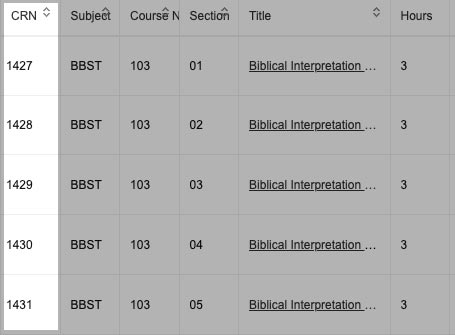
Faculty Advisor
A studentÔÇÖs faculty advisor is assigned after the studentÔÇÖs first-year.
Hold
A hold is a restriction that prevents registration or access to certain services. You may view any holds on your page and contact the relevant department to find out how to clear it. (See also MyAccount, Systems & Tools)
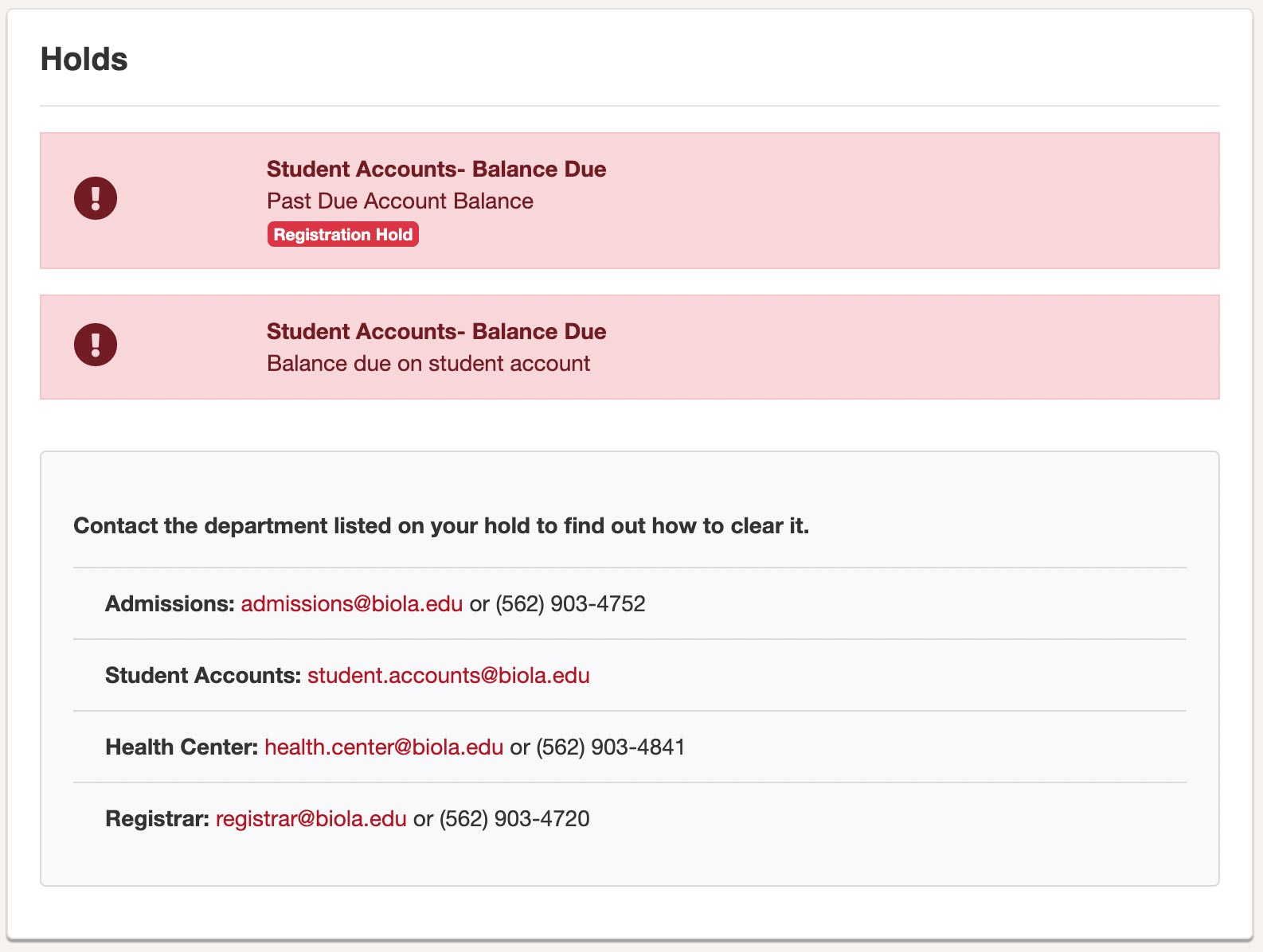
IN Grade
An IN (or Incomplete) grade is a temporary grade that allows a student to receive a course extension due to unforeseeable emergencies. Visit the Requesting an Incomplete (IN) Grade page to learn more.
Medical Withdrawal
If a student experiences a serious medical condition that prevents them from completing their courses for the semester, they may apply for a medical withdrawal with official medical documentation. Visit the page to learn more.
Override
An override grants permission to register for a class with a specific restriction (such as a required prerequisite), primarily granted by the respective department.
PIN
A Personal Identification Number (or PIN) is a 6-digit code unique to each student that allows students to access the registration system. A new PIN is provided every semester.
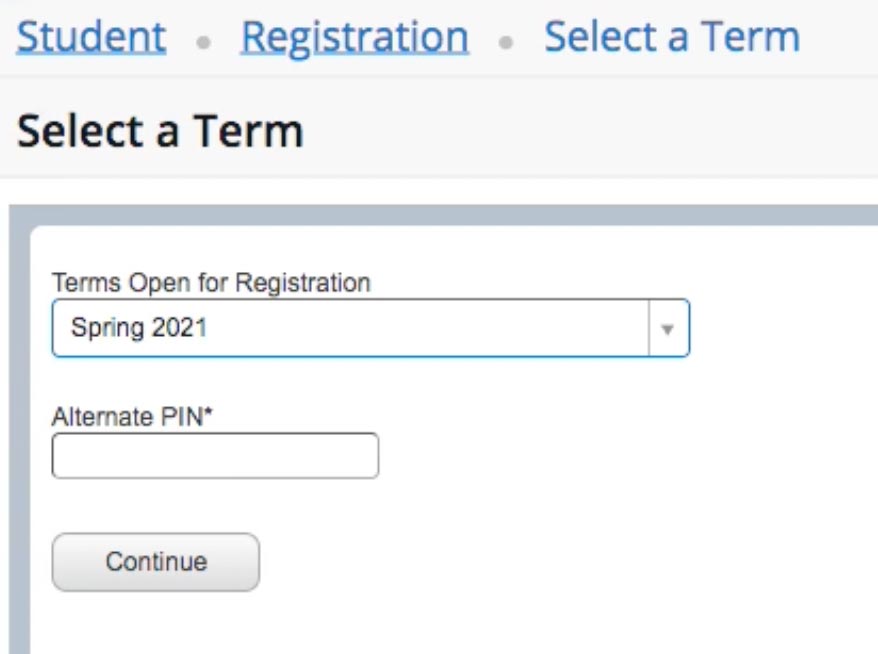
Section
A section is an individual course offering, distinguished from other offerings by date, time, location, instructor, delivery mode, etc.

Time Ticket
A time ticket is the earliest time assigned to students to register for classes based on the amount of credits a student has completed. Time tickets are released the first day of Academic Advising and appear on the MyAccount home page. (See also MyAccount, Systems & Tools)
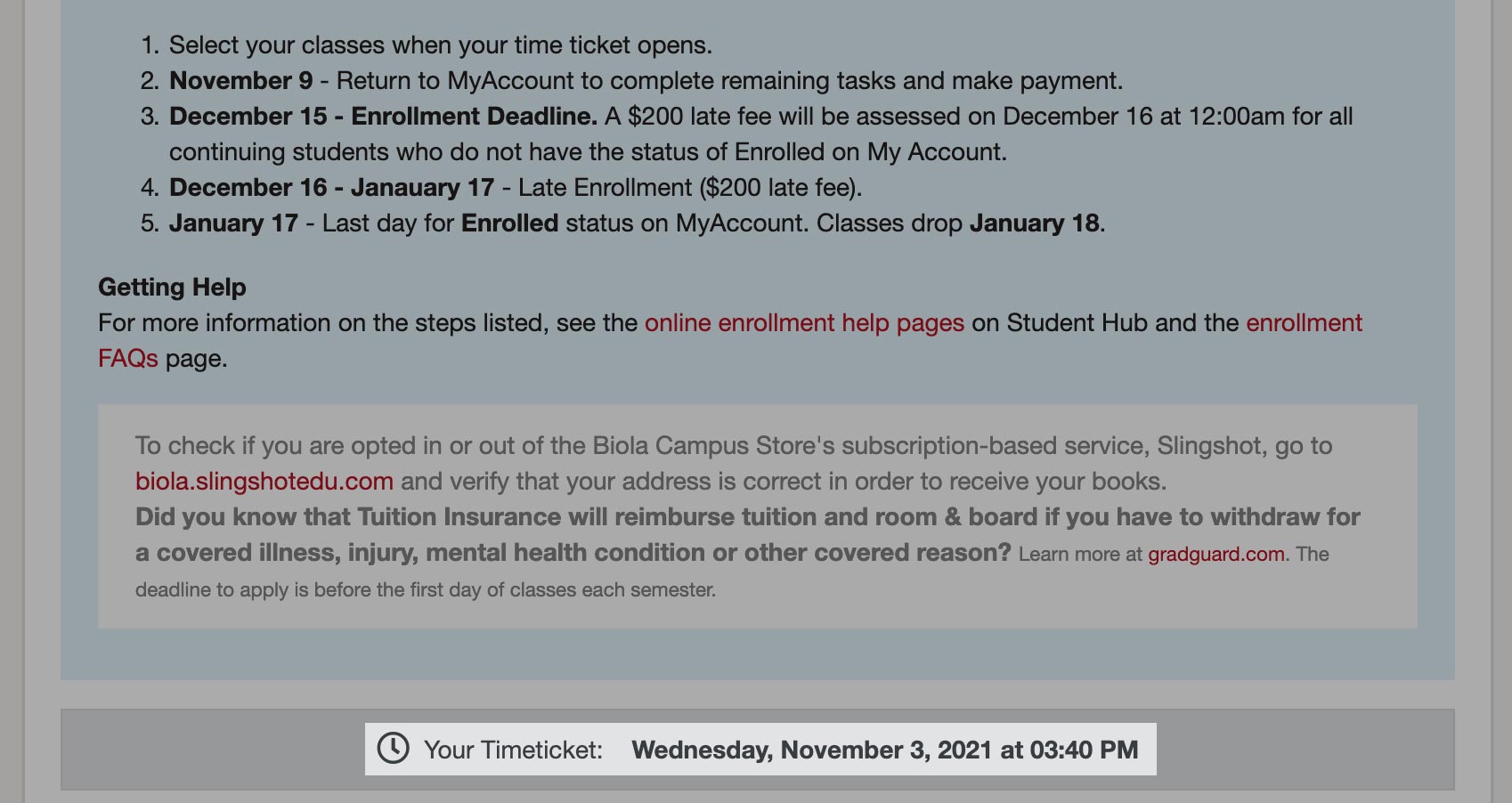
UW Grade
A UW (or Unofficial Withdrawal) grade is given to students who do not officially complete the withdrawal process by dropping a class after the drop deadline or ceasing attendance. The UW grade will influence the GPA the same as an ÔÇ£F.ÔÇØ (See also W Grade, Registration)
W Grade
A W (or Withdrawal) grade indicates an official withdrawal (within the third to eighth week) from a course and does not affect the student's grade point average. (See also UW Grade, Registration)
Waitlist
A waitlist is a list of students waiting to register for a filled class. Waitlisting does not guarantee a spot in the class. Visit the page to learn more about waitlists and how to view your position on a waitlist.
Requirements
B.A.
A Bachelor of Arts degree (or B.A.) usually implies more liberal education orientation although the differences from B.S. degrees are not always this distinct. (Adapted from the .)
B.F.A.
A Bachelor of Fine Arts degree (or B.F.A.) is a professional degree designed for students interested in pursuing a career or further studies in visual arts. Visit our Art, B.F.A. program page to learn more.
B.M.
A Bachelor of Music degree (or B.M.) is a professional degree designed for students interested in pursuing a career or further studies in Music. Visit our Conservatory of Music programs page to learn more.
B.S.
A Bachelor of Science degree (or B.S.) usually implies a more scientific or technical orientation although the differences from B.A. degrees are not always this distinct. (Adapted from the .)
Catalog Year
A studentÔÇÖs catalog year is determined by the year in which they enter ║┌¦«╩ËãÁ. The catalog for that year acts as an ÔÇ£academic contract,ÔÇØ detailing the requirements the student agrees to complete in order to graduate. Students may find their current catalog year on their Degree Audit. Visit the page to learn more. (See also Catalog, Systems & Tools)

Co-Requisite
A co-requisite (or co-req) is a course or other requirement that a student must take at the same time as another course or requirement.
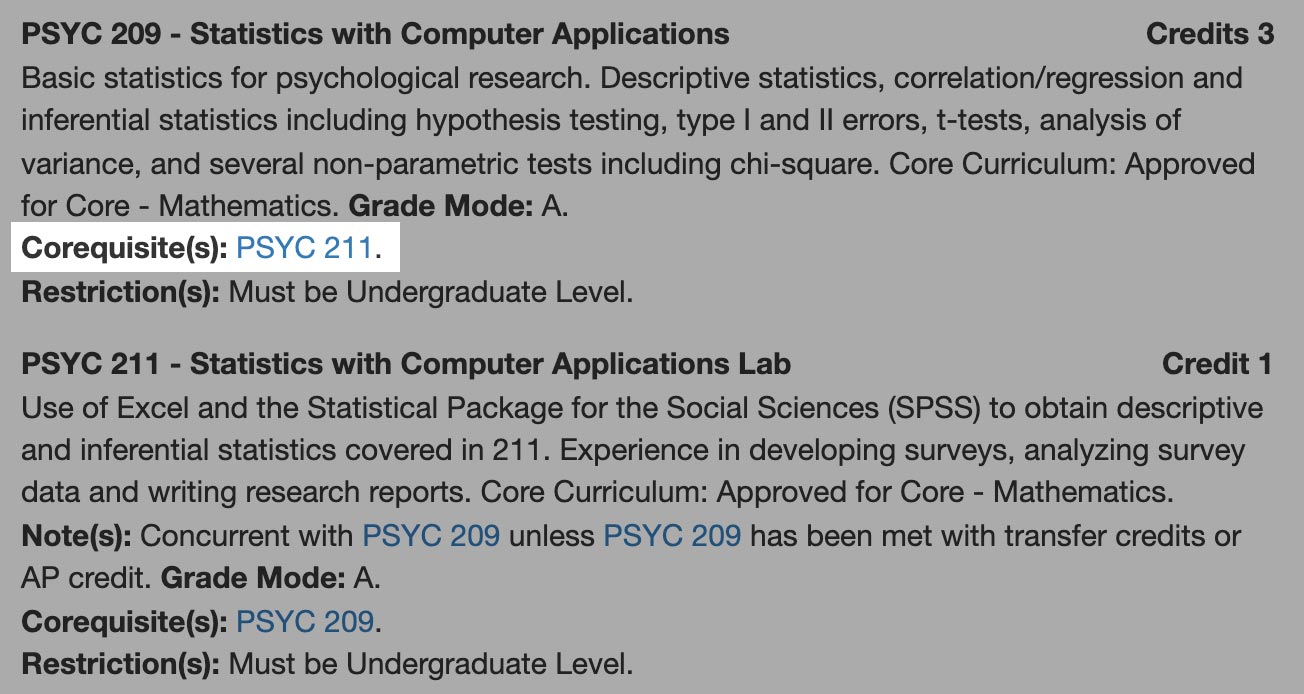
General Elective
A general elective class is an optional class students may take for credit that are most often taken in order to meet the minimum of 120 credits needed to graduate. Any class that a student is eligible to take may count as a general elective.
G.E.
General Education (GE/Gen Ed) is the set of art and science courses designed to develop holistic student competencies for lifelong learning and success. GE requirements vary based on a studentÔÇÖs degree program and may be viewed on a studentÔÇÖs Degree Audit. (See also Core Curriculum, University Structure)
Graduation Petition
A Graduation Petition (or grad petition) is a form required for graduation that maps out which requirements have been met and which have yet to be met. The petition may be acquired from the and must be submitted during the studentÔÇÖs Junior year, otherwise a registration hold and late fine will be incurred.
First Year Seminar
First Year Seminar: The Biola Experience is a 1 credit requirement designed to welcome and introduce all incoming students to the academic community, core values, and unique aspects of Biola's biblically centered, liberal arts education. This course is linked to the student's chosen major or a disciplinary theme (for students exploring majors).
Prerequisite
A prerequisite (or prereq) is a course or other requirement that must be completed prior to registering for another course or before proceeding to more advanced study unless an override is provided. (See also Override, Registration.)

WCR
The Writing Competency Requirement (or WCR) must be fulfilled in order to graduate and is primarily met by passing ENGL 313 Writing in the Disciplines with at least a C in a studentÔÇÖs Junior or Senior year. Visit the page and ÔÇ£Undergraduate ProgramsÔÇØ to learn more.
Systems & Tools
Academic Calendar
The Academic Calendar contains important dates and deadlines (e.g. observed holidays, conferences, the last day to add and drop classes, etc.) for the Fall, Spring, and Summer terms of current and future academic years.
Pro Tip: Before every semester, check the Academic Calendar and put important dates into a personal calendar to remember whatÔÇÖs coming up.
Academic Plan
A customizable semester-by-semester plan to graduate. Visit the Planner tutorial page page to learn more. (See also Planner, Systems & Tools)
Canvas
is the platform used to access completed and in-progress courses, oftentimes used to submit assignments, find syllabi, check grades, and message peers and professors.
Pro Tip: Download the app and turn on email/push notifications in case professors send out announcements about assignments or class cancellations.
Catalog
The is an official publication describing academic programs, student services, general regulations, requirements, and procedures; it is the most accurate source for information. (See also Catalog Year, Systems & Tools)
Class Search Page
A search tool used to find information about specific courses and core requirement options in past, current, and future terms. You may access it by going to MyAccount > Degree Planning > Class Search Page.
Pro Tip: If a class isnÔÇÖt appearing the first time you search it, refresh the page and try again. If it doesnÔÇÖt appear the second time, it likely isnÔÇÖt offered.
Course Sequence
A generic 4-year suggested plan to graduate housed in the University Catalog and created by the department. Visit our Degree Requirements page to learn more.
CPW
A Course Planning Worksheet (or CPW) organizes a tentative schedule with CRNs, course titles, and credits.
Degree Audit
A checklist of requirements categorized by major, General Education, and minor. You may access it by going to MyAccount > Degree Planning > Degree Audit. For more information on navigating the Degree Audit, visit the Degree Audit FAQ page.
Pro Tip: Use the ÔÇ£What-If ToolÔÇØ on the left sidebar to see what it would look like to change majors or add minors.
Directory
The is an online resource to find general contact information for Biola faculty, staff, departments, and students.
Handshake
is a platform for job-search and career-related services. Students may schedule appointments with the Biola Career Center, apply for on- and off-campus jobs and internships, and network with employers.
MyAccount
is an online resource that contains vital links to student registration, enrollment, housing, and campus life. Students may view their enrollment status, financial aid tasks, personal information, resources for degree planning, and other student tools.
Navigate
is a platform where you may schedule Academic Advising appointments, view your academic success team (professors, department administrators, Peer Academic Advisors), and message your success team.
Planner
Planner is an advising tool that helps students map out a journey toward academic program completion and graduation. You may access it by going to MyAccount > Degree Planning > Degree Audit > ÔÇ£New DashboardÔÇØ at the top left > ÔÇ£PlansÔÇØ at the top. For more information on navigating the Planner Tool, visit the Planner FAQ page. (See also Academic Plan, Systems & Tools)
Student Hub
The is an online compilation of department information, services, and resources for Biola students.
Syllabus
A syllabus is a document that lists course policies, requirements, expectations, required texts, and commonly a semester calendar and list of assignment descriptions and deadlines. Syllabi are typically distributed the first week of classes and oftentimes accessed in the Canvas course.
TES
The Transfer Evaluation System (or TES) lists pre-approved course equivalencies from other institutions.
Transcript
A transcript is a document that shows the courses you have taken, the grades earned, and a cumulative grade point average (GPA). Visit the Transcripts: Ordering, Fees, and Policies page for more information.
Pro Tip: If you are requesting a transcript to transfer credits, make sure youÔÇÖre ordering an official transcript.
University Structure
Chair
A (department) chair is a faculty member assigned by the dean of the school to oversee that particular department.
Classification of Students
A student's classification is determined at the beginning of each semester according to the following plan:
- Freshman: 26 credits or fewer completed
- Sophomore: 27ÔÇô56 credits completed
- Junior: 57ÔÇô87 credits completed
- Senior: 88 credits or more completed
Commencement
Commencement is the graduation ceremony held at the end of the Fall and Spring semesters to celebrate students that have completed the entirety of their degree requirements. Visit the Commencement page to learn more.
Concentration
A concentration is a focus within a major. Not all majors have concentrations, but some majors have multiple concentration options for students to choose from.
Core Curriculum
The Core Curriculum represents the comprehensive program of liberal arts and sciences integrated with the biblical and theological studies minor which are the hallmarks of a Biola education. Core curriculum requirements vary based on a studentÔÇÖs degree type and degree program.
Course Numbers
The course numbering system is designed to indicate the relative academic level of courses in this manner:
| 000-099 | Remedial or developmental courses |
| 100-299 | Undergraduate, lower-division, baccalaureate level courses |
| 300-499 | Undergraduate, upper-division, baccalaureate level courses |
| 500-799 | Graduate level, normally indicating first through third year beyond baccalaureate |
| 800-999 | Postgraduate, indicating fourth year beyond baccalaureate |
| and 8000s |
Credits
A single credit hour represents a minimum of three hours (50 minutes per hour) of substantive learning time per week over the course of a fifteen-week semester. Courses shorter than 15 weeks adjust the distribution of the substantive learning time yet still represent the same total number of substantive learning hours.
Dean
The dean is the assigned administrator over a school within the University, overseeing the chairs/faculty, staff, and programs in the school.
Department
An academic department consists of one or more major programs that share an academic discipline (such as the Chemistry, Physics, and Engineering Department or the Conservatory of Music.)
Division
A division is a grouping of departments within a school that share similar disciplines (such as the Division of Science and Technology within the School of Science, Technology, and Health or the Division of Communication within the School of Fine Arts & Communication.)
Double Degree
A double degree is the pairing of two different degree types such as a B.A. and a B.S. Note: If you have a double degree, you may toggle between your degree requirements on the Degree Audit by clicking the ÔÇ£DegreeÔÇØ dropdown bar at the top right of the header and selecting the second degree option.
Double Major
A double major is when you pursue two fields of study within the same degree type.
Lower-Division (LD)
A lower-division course is any 100- or 200- level course. (See also Upper-Division, University Structure)
Minor
A minor is a secondary (or even tertiary) academic discipline in addition to oneÔÇÖs primary field of study, oftentimes 18-30 credits. Visit the page and filter the categories to view Biola minors.
Schools
A school is most commonly a grouping of departments with similar disciplines (although some schools consist of one program) and is overseen by an appointed dean. ║┌¦«╩ËãÁ has 9 schools. Visit the Majors, Degrees, and Programs page to see the list of schools and their programs.
Stewart
The Stewart Science Honors program is a highly selective and academically rigorous interdisciplinary program guided by research and technology. Built on a collaborative community of exceptional students and faculty, original research, and national leaders in STEM fields, this program aims to produce innovative leaders in the sciences. Visit the Stewart Science Honors page to learn more.
Torrey
The Torrey Honors Program is a cohort-style reading and discussion based program with close faculty mentorship. Visit the Torrey Honors page to learn more about the curriculum and application process.
Traditional Undergraduate
A Traditional Undergraduate student pursues their degree entirely in-person. (See also PTUG, University Structure)
Upper-Division (UD)
An upper-division course is any 300- or 400- level course. (See also Lower-Division, University Structure)